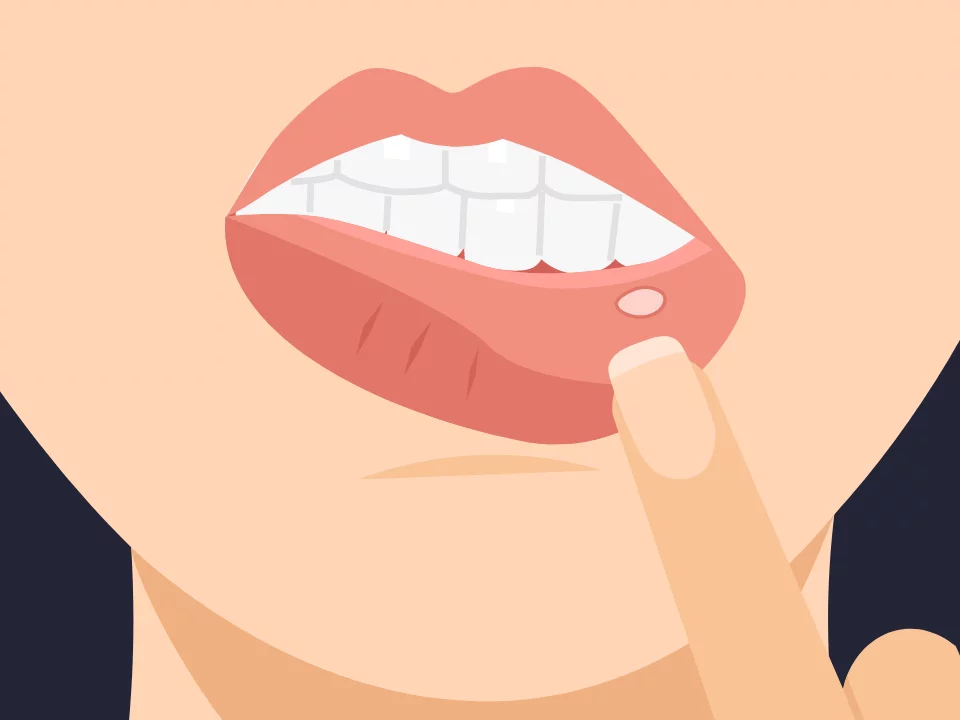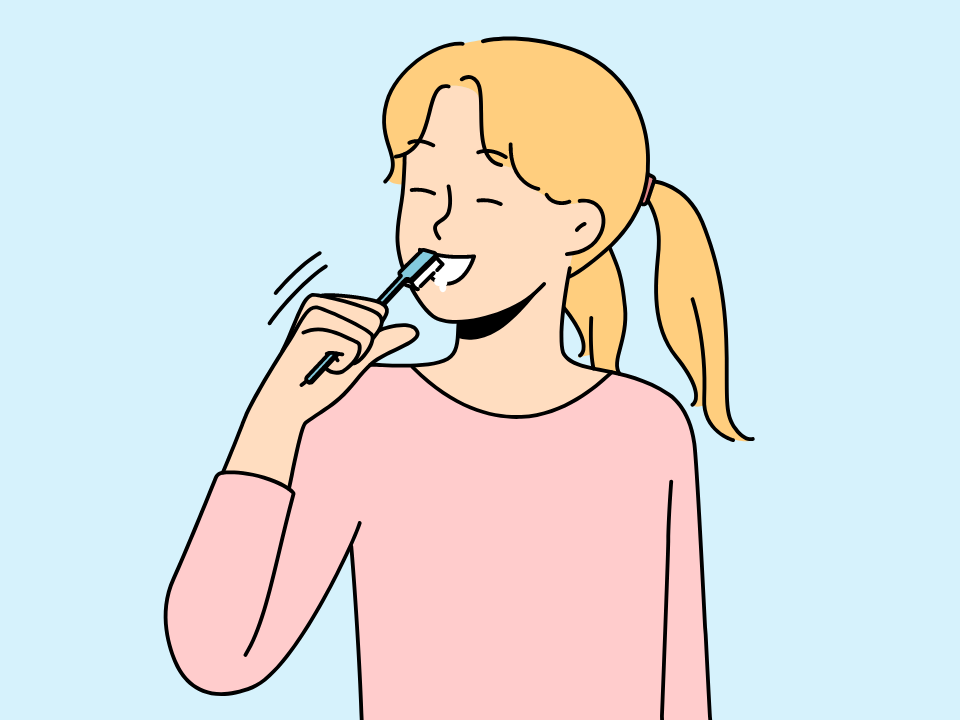🧾 Quick Summary
Mouth ulcers are small but painful sores that can pop up from stress, injury, or even certain foods
They’re not contagious, but they can make eating and talking uncomfortable
With the right care, they usually heal fast—and there are ways to keep them from coming back
Wondering why that little sore in your mouth is causing big discomfort? Learn what mouth ulcers are, what triggers them, and the best ways to treat and prevent them—so you can heal faster and feel better.
Mouth ulcers and sores are common issues that plague a significant portion of the population. Perhaps you have already experienced the searing pain they can bring after taking a bite of a particularly acidic fruit or noticed what feels like a mountain protruding from your cheek that impedes the simple pleasures in life, like good food and great conversation. If you’re looking for relief from the discomfort that mouth ulcers and sores bring, it’s important to analyze the symptoms to determine what you’re facing and what the best course of treatment will be.
What Is a Mouth Ulcer?
Key Things to Know:
Mouth ulcers are painful, non-contagious sores often caused by trauma like accidental cheek bites.
Canker sores are internal ulcers, while cold sores are viral, contagious, and appear outside the mouth.
Mouth sores can result from trauma, infections, diseases, allergies, hormone changes, or stress.
A mouth ulcer is a non-contagious lesion in the mouth that is usually quite painful and irritating. For example, imagine you’ve just sat down with a piping hot slice of your favorite pizza…you take a huge bite of the pizza, then, in the midst of your enthusiasm, take a bite out of your cheek. A lesion is formed from the bite, bacteria enter the lesion, and a mouth ulcer is born.
Canker sores are called a “sore” but are actually mouth ulcers with a different underlying cause. Conversely, a cold sore is also called a “sore” but is not a mouth ulcer at all – cold sores stem from a virus, are found outside the mouth (usually on the lips), and are highly contagious.
What Causes Mouth Sores and Ulcers?
- Trauma, such as accidental biting, scratching, or damage from orthodontic appliances
- Viral infections, such as oral herpes
- Various underlying conditions, such as Aphthous Stomatitis, which can lead to canker sores
- Allergic reactions and food sensitivities
- Fluctuations in hormones
- Different types of diseases such as HIV/AIDS, Behcet’s Disease, and Crohn’s disease, to name a few
- Burns from acid reflux, hot food and drinks, or highly acidic foods
- Resurgence of a dormant virus due to a trigger, such as canker sores developing regularly during a high-stress season of life
Mouth Ulcer Symptoms
Key Things to Know:
Mouth ulcers can appear anywhere in the mouth, including the tongue, lips, and gums.
They are round or oval, under one centimeter, and may be white, gray, yellow, red, or a mix.
Ulcers are often very painful, especially when irritated by eating, talking, or dental appliances.
Mouth ulcers can be found in any part of your mouth, including:
tongue
lips
cheeks
gums
roof of the mouth
A variety of visual clues indicate the presence of mouth ulcers. They are usually round or oval and can vary in size, typically not exceeding one centimeter in diameter. Mouth ulcers can appear white, gray, yellow, or bright red – or a combination of those colors. The bright red is especially prevalent when there is inflammation present.
Treatment for Mouth Ulcers and Sores
Key Things to Know:
Most mouth ulcers heal on their own within one to two weeks.
Over-the-counter treatments like numbing gels, anti-inflammatory painkillers, and antimicrobial mouthwash can reduce pain and irritation.
Natural remedies include saltwater rinses, milk of magnesia, tea bags, and ice for relief.
Mouth ulcers do not necessarily need treatment – most clear up on their own within a week or two. However, if you’re suffering from ulcers and sores, you’re probably wondering how to cure a mouth ulcer. Most people would like them to heal with as little discomfort as possible, so there are several treatments that can ease the pain during the healing process. Using these treatments may also speed the healing process by reducing the amount of irritation to the mouth sore.
- Applying a topical numbing treatment such as Orajel or Anbesol
- Taking a painkiller with anti-inflammatory properties such as Ibuprofen or other NSAIDs (nonsteroidal anti-inflammatory drugs)
- Using an antimicrobial mouthwash from your local pharmacy
- If you’re looking for how to cure mouth ulcers fast naturally, there are several types of mouth sore treatments that don’t involve chemicals or harsh ingredients:
- Do a warm saltwater rinse two to three times a day, as it will promote healing and keep the sore from getting worse
- Apply milk of magnesia directly to the mouth ulcer
- Rest damp tea bags on affected areas to ease the pain
- Use ice to numb canker sores
Prevention of Mouth Ulcers
Key Things to Know:
Manage stress through exercise, relaxation, and good sleep to help prevent ulcer flare-ups.
Avoid irritating foods like spicy, crunchy, or acidic items to reduce the risk of mouth injuries.
Practice good oral hygiene and be mindful while chewing to prevent trauma and bacterial buildup.
While you’re looking into how to cure mouth sores in the present, it’s also important to think ahead as to how to prevent mouth ulcers in the future. There are several commonsense ways to prevent recurrences, many of which are just basic principles of self-care that will benefit you on different levels.
Foods To Avoid to Prevent Mouth Ulcers
Avoid foods that might cause irritation, especially those that are spicy, crunchy, or highly acidic. One slip of the corner of a tortilla chip could dig into your gums and cause a mouth ulcer you’ll have to deal with for days on end! Choose foods that are healthy and part of a balanced diet, ensuring that you get the appropriate vitamins and minerals necessary on a daily basis for your body to be healthy and ready to fight infection.
What Are The Different Types of Mouth Sores?
- Canker Sore – non-contagious, shallow lesions that develop on the gums or in different areas of the mouth. They can also be referred to as aphthous ulcers and usually stem from a condition called Aphthous Stomatitis.
- Blister – a lesion that can occur in several different places, both inside the mouth and outside on the lips. Blisters can be a result of a virus, such as the herpes simplex virus, or a variety of other causes, like a canker sore or a mouth burn from excessively hot food.
- Bump – bumps in the mouth such as mucocele, warts, or the beginning of an aphthous ulcer (canker sore) may be signs of underlying conditions and potentially may need to be evaluated by a professional.
- Aphthous Ulcer – a canker sore.
- Cold Sore – highly contagious, caused by a viral infection; also referred to as a fever blister.
- Herpes – a virus, Herpes Simplex Virus, that causes chronic cold sores.
Find a Dentist Near You to Treat Mouth Ulcers and Sores
- A mouth ulcer or sore that doesn’t heal after two weeks
- A mouth ulcer that has a diameter greater than two centimeters
- Three or more mouth ulcers present at one time
- A history of oral cancer, HPV, or other conditions directly related to oral health
- A history of gum disease
- A recurring mouth ulcer
- Unbearable pain from a mouth ulcer or sore
- A high fever along with mouth sores
If you are experiencing any of these issues, it’s important to see a professional. There is no need to suffer unnecessarily, and early detection is key when it comes to identifying red flags of major health concerns that may be happening beyond your oral health. Dentists are highly trained in determining not only how to treat surface issues but also how to diagnose underlying health issues that could be causing mouth sores and ulcers. If you aren’t an established patient with a dentist and you're asking yourself where to find a dentist near me, use The Smile Generation “Find a Dentist” tool for help finding a capable, caring dentist near you.
Find your trusted, local dentist today!
Mouth Ulcer and Canker Sore FAQs
Recurring mouth ulcers may be linked to repeated trauma (like biting the inside of your mouth), irritation from braces, viral infections, or underlying conditions like aphthous stomatitis.
Mouth ulcers can result from various factors, including trauma (like accidental biting or damage from orthodontic appliances), viral infections (such as oral herpes), and underlying conditions like aphthous stomatitis.
Canker sores are non-contagious lesions in the mouth.
Poor oral hygiene can lead to bacterial infections, especially if there's an open lesion from trauma, resulting in mouth sores.
Mouth ulcers form when trauma (like biting the cheek) creates a lesion, allowing bacteria to enter and cause an ulcer.
Sores on the gums may result from trauma, viral infections, or underlying conditions such as aphthous stomatitis.
Sources
- National Health Service (NHS). (n.d.). Mouth ulcers. NHS. Retrieved from https://www.nhs.uk/conditions/mouth-ulcers/ (Accessed May 8, 2025)
- Mayo Clinic. (2023, March 10). Canker sore (aphthous ulcer) – Symptoms and causes. Mayo Clinic. Retrieved from https://www.mayoclinic.org/diseases-conditions/canker-sore/symptoms-causes/syc-20370615 (Accessed May 8, 2025)
- Healthline. (n.d.). Mouth ulcers: Causes, symptoms, and treatment. Healthline. Retrieved from https://www.healthline.com/health/mouth-ulcers (Accessed May 8, 2025)
- Better Health Channel. (2022). Mouth ulcers. Better Health Channel. Retrieved from https://www.betterhealth.vic.gov.au/health/conditionsandtreatments/mouth-ulcers (Accessed May 8, 2025)
- Colgate. (n.d.). Blisters in mouth tissue. Colgate. Retrieved from https://www.colgate.com/en-us/oral-health/mouth-sores-and-infections/blisters-in-mouth-tissue (Accessed May 8, 2025)
- Canadian Cancer Society. (2023). Non-cancerous tumours in the mouth. Canadian Cancer Society. Retrieved from https://cancer.ca/en/cancer-information/cancer-types/oral/what-is-oral-cancer/non-cancerous-tumours (Accessed May 8, 2025)
- Cedars-Sinai. (n.d.). Herpes simplex virus (HSV) mouth infection. Cedars-Sinai. Retrieved from https://www.cedars-sinai.org/health-library/diseases-and-conditions/h/herpes-simplex-virus-hsv-mouth-infection.html (Accessed May 8, 2025)
Smile Generation blog articles are reviewed by a licensed dental professional before publishing. However, we present this information for educational purposes only with the intent to promote readers’ understanding of oral health and oral healthcare treatment options and technology. We do not intend for our blog content to substitute for professional dental care and clinical advice, diagnosis, or treatment planning provided by a licensed dental professional. Smile Generation always recommends seeking the advice of a dentist, physician, or other licensed healthcare professional for a dental or medical condition or treatment.









